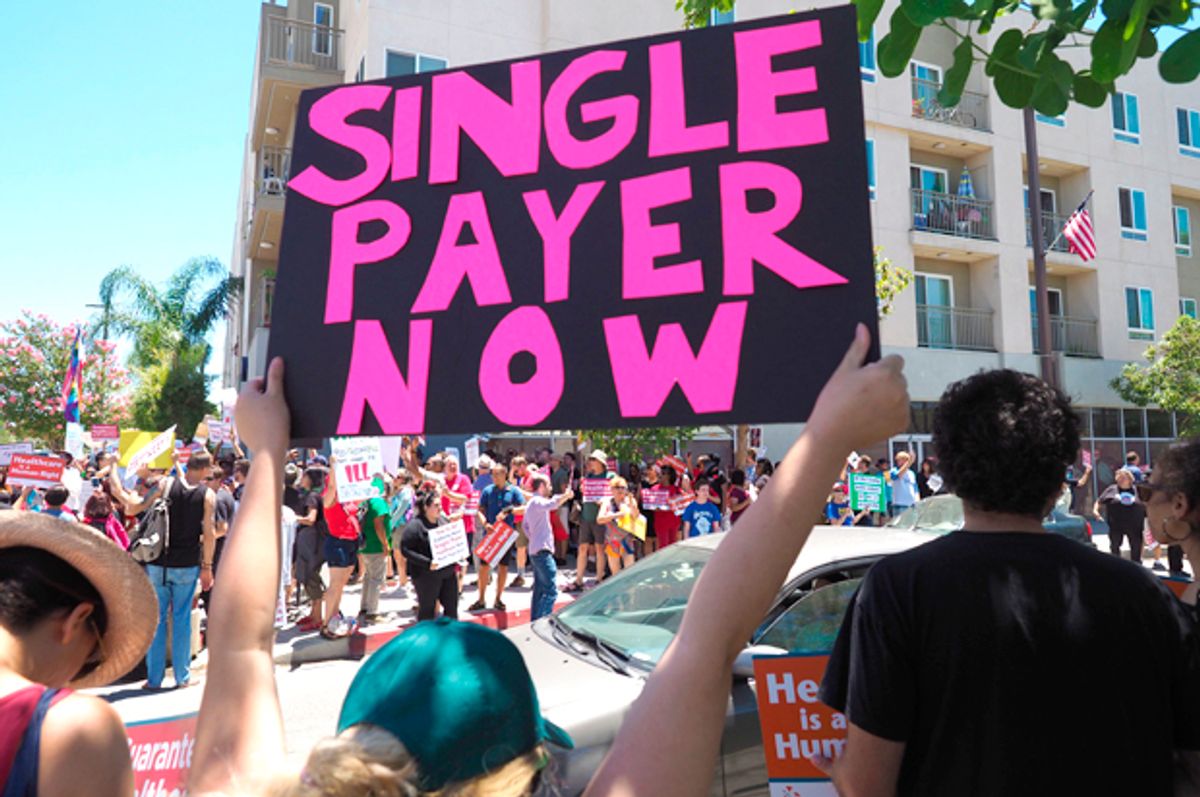The very public battle over Trumpcare — which seems like it may, fingers crossed, be collapsing due to the public rejecting the ejection of millions of people from the health care system — seems to have had the side benefit of increasing public interest in the idea of a single payer government-run health insurance system. Polling shows that anywhere from 33 percent to 44 percent to 58 percent of voters back the idea of single payer, and in blue states that theoretically have the tax base to pull off statewide system — such as New York or California — single payer likely could garner more support.
And yet one of the bluest of states, California, has once again failed to get a single payer bill off the ground, in no small part because it was, as David Dayen at the Intercept argued, "a shell bill that cannot become law without a ballot measure approved by voters."
Dayen blames single payer proponents for not "committing to raising the millions of dollars that would be needed to overcome special interests and pass that initiative"and accuses them of "hiding the realities of California’s woeful political structure in favor of a morality play designed to advance careers and aggrandize power."
When one looks at the players involved, it's hard to deny Dayen's accusation. But it's also worth pointing out that single payer, as it's currently constructed, faces a major political obstacle that even a lot of electoral hustle may not be able to overcome: People really do not want to see their taxes raised to pay for it. Proponents of single payer aren't doing enough to address that objection.
The good news is that there are ways to address these voter concerns. The first step, however, is admitting that tax raises are a real problem.
Polling data shows this. The majority of California residents, 65 percent, say they want a single payer system, but that level of support drops to 42 percent if it will require a tax raise.
Proponents of single payer tend to counter this objection by pointing out that these taxes will replace spending on private health insurance and would reduce health care spending overall. That is true in a macroeconomic sense, but it fails to take into consideration that the majority of people below Medicare eligibility age get their health insurance through their employers.
The perception is going to be, like it or not, that single payer is shifting the responsibility for paying for health insurance off of employers and onto the shoulders of workers. People aren't going to care about reduced health care costs if they think their bosses reap the bulk of the savings.
Why that gets so frequently overlooked, I have no idea. Otherwise, progressives seem to grasp that squeezing the workers while letting the bosses off the hook tends not to go down well with voters. The problem might be that there's been a longing for single payer for so long in progressive circles that any objections are written off as neoliberal corporatist nonsense — a theory I suspect much of the response to this article will prove.
But if one accepts that this is a problem, then there's all sorts of creative ways to address it. One way is to dispense with single payer bills and instead have states offer a Medicaid buy-in that employers can access, with the hopes that the lowered costs will allow Medicaid to eventually conquer the market. Or perhaps payroll taxes are structured so that employers pay a larger chunk, so workers don't feel the pinch.
I say it's time to get freaky with it. My proposal: Write the bill so that it requires employers to compensate their employees who lose their health care benefits with a raise in their paycheck. Then the plan could be marketed as "health care for all, plus a raise at work." Higher taxes go down easier if you're getting a raise to cover them.
The best part is that this could be a win/win situation. One of the bigger problems facing employers is that insurance premiums are rising while the value of what they get for it is not improving. Giving the money to employees directly in cash would actually be cheaper in the long run because employers would be escaping that inflation pressure. Employees see more money in their paychecks while the per-employee costs for the employer don't rise as fast.
Ideally the raise would be one that's equivalent to what the employer pays annually to the insurance company to cover that employee's health care plan, but that could be negotiable depending on how much the employer will be on the hook for in higher payroll taxes. The details are less important here than sending the message to voters that single payer is not about shifting the health care burden away from employers to employees.
This is just one idea, of course. There may be — probably are! — other ways to deal with this political problem that make more sense economically. The main issue here is that the larger economic savings of single payer sound great in the abstract, but will be hard to sell if voters don't feel that they personally are seeing those savings in their checking accounts. As long as single payer proponents fail to address that political problem, there's very little chance of getting a single payer bill off the ground.



Shares